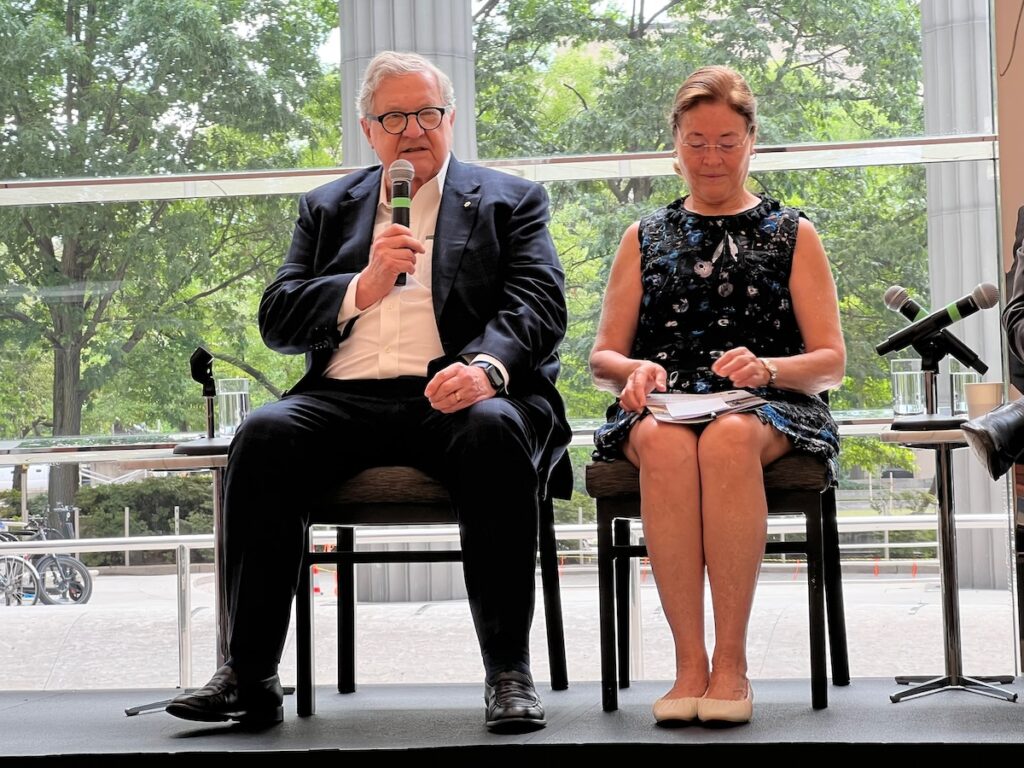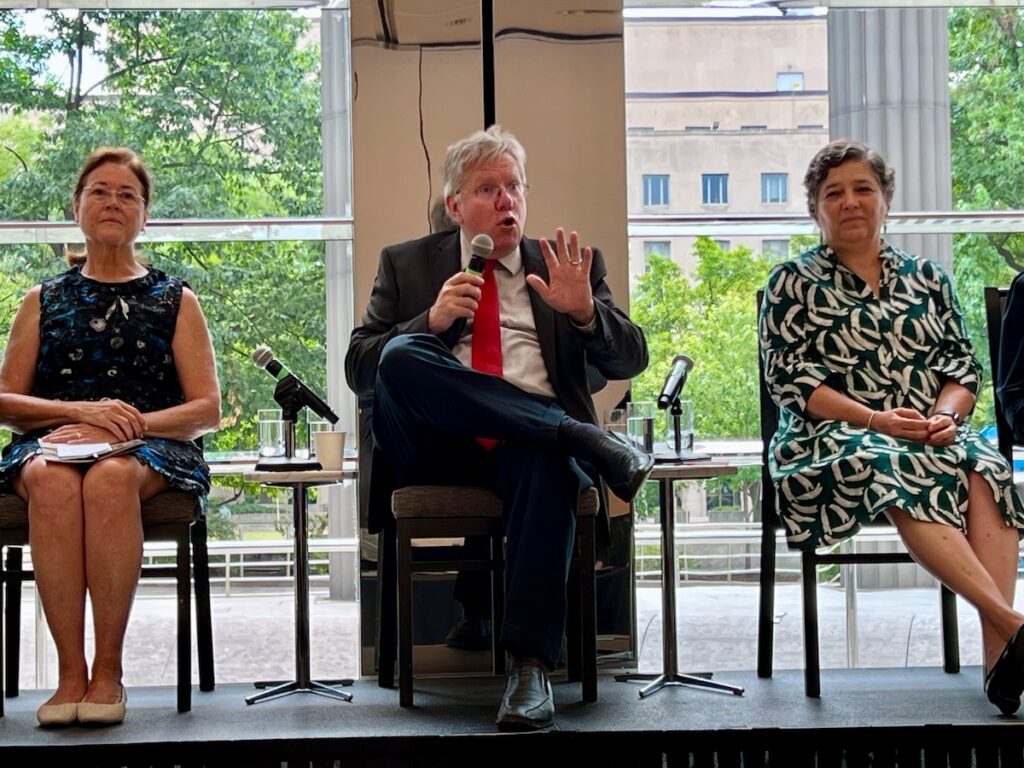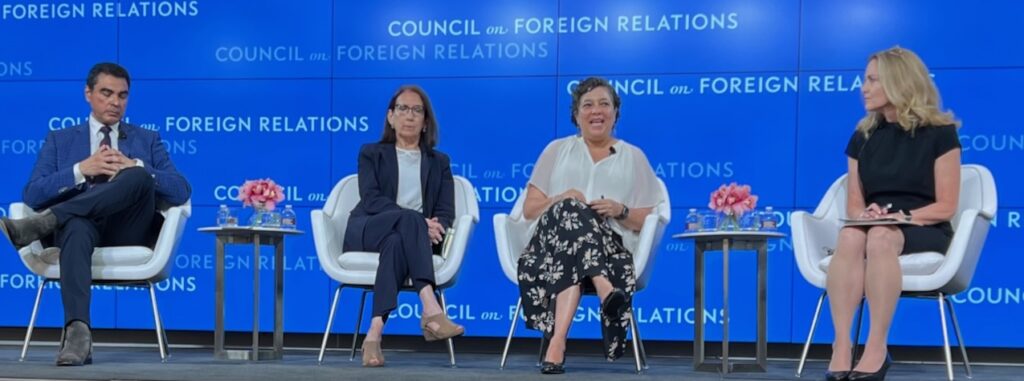Grupo de Trabajo de Centro y Norteamérica sobre Migración — Policy Dialogue on Irregular Migration and Forced Displacement
Canadian Embassy, Washington, DC — 27 June 2023
Grupo de Trabajo de Centro y Norteamérica sobre Migración members met with ambassadors and embassy staff from the region, including from Comprehensive Regional Protection and Solutions Framework (MIRPS) countries, representatives of government agencies and international organizations for a facilitated policy dialogue based on findings and recommendations issued by the Task Force. Read a summary of the key recommendations here.
The event, hosted by the Embassy of Canada to the United States in Washington, DC, with the financial support of Global Affairs Canada, kicked off with a welcome address from Deputy Head of Mission for Canada Sara Cohen who set the stage for the policy dialogue by outlining Canada’s focus on migration and forced displacement in the Americas.
Task Force Co-Chair and former Canadian Minister of Foreign Affairs Lloyd Axworthy opened the dialogue by explaining the significance of the Task Force’s work in the region. The Task Force “really began with the purpose of finding practical solutions, effective policies, to take the language and the rhetoric and the commitments into something that would actually directly affect the lives of those who were being displaced.” He described the work of the Task Force over the last two years, and its meetings through the region and held virtually, as a remarkable gathering of ideas, policy options and experiences shared by refugees and others displaced in the region. He noted that a major part of the Task Force’s work has focused on mechanisms for improving regional cooperation and responsibility sharing, with a proposed regional Council, based in part on the Arctic Council, as an opportunity to better coordinate the various institutions and efforts around forced displacement while ensure active participation from migrants and displaced persons themselves.


Andrew Selee, President of the Migration Policy Institute and active Task Force member, moderated the discussion with Task Force members and participants. He stressed that among the many important recommendations to come from the work of his colleagues expanding legal pathways and creating specific opportunities to form a layered approach to protection along their journeys were crucial in a rapidly evolving migration situation in the region. He called on Task Force members who joined the policy dialogue in Washington, DC.
- Mayu Brizuela de Avila, former Minister of Foreign Affairs, El Salvador (Co-chair), emphasized the plight of child migrants, many of whom have been sent ahead and alone by their families due to current migration policies. She said that her work focuses on missing persons who are often migrants without sufficient protection. She noted also that internal displacement is a significant factor in the countries of the Americas but that it is not receiving enough attention.
- Silvia Giorguli, President, Colegio de México (Co-chair), spoke about changing migration and demographic trends in the Americas, along with a Mexican perspective on US migration policy and Mexico’s new-found role has a receiving country of asylum seekers. She noted that migration policies are not working to protect children and families as they’re designed for economic migrants and temporary workers.
- Katharine Donato, Donald G. Herzberg Professor of International Migration, Georgetown University, said that many countries in the Americas aren’t taking migration seriously, in part because of not having needed to as much in the past, but that there is a real need for countries to improve their policies. While there continues to be skepticism, new regional processing centres may provide much needed support and that parole programs indicate potentially positive responses.
- Allert Brown-Gort, Center for U.S.-Mexican Studies, Visiting Professor of International Relations, Autonomous Tech. Institute of Mexico and US-Mexico relations, noted that migration has changed very quickly in Mexico. Asylum requests have increased by 1000% in the past five years, including from countries well outside Central America, the traditional sending countries.
- Jayne Fleming, Director of International Refugee Protection Programs, Reed Smith LLP, and International Director, Lamp Lifeboat Ladder, discussed the very real dangerous to migrants, especially women who are subjected to sexual violence. She noted that only 1% of those who need protection are able to access it. She said there is an immediate need for new public-private partnerships to safely resettle these women in Canada and the United States.
- Gina Kawas, Fellow, Wilson Center, said that Honduras is experience unprecedented human mobility. Numbers of migrants moving through Honduras have increased significantly even as the number of Honduran migrants encountered at the US border since 2019 is second in the region, tied with Guatemala. She also noted that the “remittances trap” is something that’s not discussed enough because remittances provide 30% of GDP in Honduras and there’s really no incentive to address migration because of the significant revenue.
Andrew Selee then led a question-and-answer dialogue with participants. Lindsay Jenkins, senior advisor at the US Department of State’s Bureau of Population, Refugees, and Migration, said that the Task Force’s work lines up with a rapidly developing effort as part of the Los Angeles Declaration to try to figure out how we respond to historic levels of irregular migration, and displacement, which can only be accomplished through regional cooperation. Reina Mejia Chacón, former vice president of the Inter-American Development bank, spoke about financing in the region. Anna Gallagher, Executive Director of the Catholic Legal Immigration Network, asked about the importance of better understanding push and pull factors around migration. Ana Aguilera, Social Development Specialist, Latin America & Caribbean Region, The World Bank, stressed that integration is an important conversation around migration, but also that sheer complexity of the migration systems in the region creates challenges for migrants, with some 700 NGOs providing legal services to try an navigate the options.
Lloyd Axworthy closed out the session by discussing the response by Canada and other countries to the needs of Indochinese refugees after 1975. He said that the response provides a lesson as well as a model for how countries in the Americas should address the current situation, through regional processing centres, new commitments but more countries, actively promoting private sponsorship programs, and a focus on supporting front-line organizations on the ground.
Institute for the Study of International Migration Policy Dialogue —
Mortara Center, Georgetown University — 27 June 2023
The final segment of the Task Force’s Washington, DC, meetings was a policy dialogue held under Chatham House rule hosted by the Katharine Donato and the Institute for the Study of International Migration at Georgetown University. The conversation focused on regional cooperation and specific policies and their potential impacts, including the opportunities for regional processing centers for in-country or near-country asylum claims. In addition to Task Force members who participated at the Embassy, participants included Adam Hunter head of immigration policy and Nathan Williams, policy advisory, of the US Department of Homeland Security; Jon Hoisaetter, UNHCR; Chris Ramon, Unidos; Álvaro Botero, Organization of American States and Inter-American Dialogue; Alejandra Brown, US Refugee Advisory Board; Tara Watson, Brookings; Jennifer Podkul, KIND; Diana Negoponte, Wilson Center.
Addressing the Root Causes of Migration in the Western Hemisphere — Council on Foreign Relations Panel Discussion — 26 June 2023

The Council on Foreign Relations hosted an important panel discussion on migration in the Americas at their headquarters in Washington, DC, on July 26. The event, the Silberstein Family Annual Lecture on Refugee and Migration Policy: Addressing the Root Causes of Migration in the Western Hemisphere, featured Task Force Co-Chair Silvia Giorguli, President, El Colegio de México, Task Force member Katharine Donato, Donald G. Herzberg Professor of International Migration and Former Director, Institute for the Study of International Migration, Georgetown University, and research contributor Manuel Orozco, Director, Migration, Remittances and Development Program, at Task Force founding partner organization Inter-American Dialogue. The event was moderated by Kellie Meiman Hock, Managing Partner at McLarty Associates. More than 200 participants joined in-person and virtually, including US Senate and Congressional representatives, think tanks, academic institutions, and journalists.
The speakers commented on specific aspects of the findings and recommendations presented in reports published by the Task Force. Opening discussions focused on the core topic of drivers of migration, both in the three countries of Central America’s Northern Triangle region — Guatemala, El Salvador and Honduras — as well as the broader region given rapidly shifting migration patterns in the region. The panelists addressed a range of related issues, including the need for increasing legal pathways of migration both to open labour opportunities but also to ensure humanitarian protection. The panelists also spoke to issues around regional cooperation, including nascent regional processing centers for asylum requests, as well as evolving narratives around migration and integration, including for returnees. The important role of remittances for the families of migrants and the economies of the region was discussed, along with the fact that much work needs to be done to capitalize on remittances including for investments in education.
